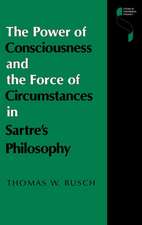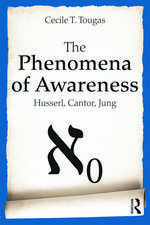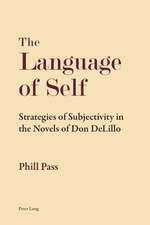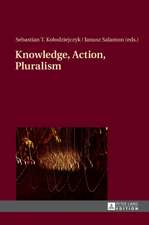The Beginning of Western Philosophy – Interpretation of Anaximander and Parmenides: Studies in Continental Thought
Autor Martin Heidegger, Richard Rojcewiczen Limba Engleză Hardback – 4 feb 2015
Din seria Studies in Continental Thought
-
 Preț: 280.12 lei
Preț: 280.12 lei -
 Preț: 136.59 lei
Preț: 136.59 lei -
 Preț: 174.22 lei
Preț: 174.22 lei -
 Preț: 137.37 lei
Preț: 137.37 lei -
 Preț: 247.15 lei
Preț: 247.15 lei -
 Preț: 198.41 lei
Preț: 198.41 lei -
 Preț: 154.57 lei
Preț: 154.57 lei -
 Preț: 101.93 lei
Preț: 101.93 lei -
 Preț: 153.87 lei
Preț: 153.87 lei -
 Preț: 389.99 lei
Preț: 389.99 lei -
 Preț: 211.96 lei
Preț: 211.96 lei -
 Preț: 306.22 lei
Preț: 306.22 lei -
 Preț: 234.78 lei
Preț: 234.78 lei -
 Preț: 160.61 lei
Preț: 160.61 lei -
 Preț: 242.38 lei
Preț: 242.38 lei -
 Preț: 102.86 lei
Preț: 102.86 lei -
 Preț: 377.90 lei
Preț: 377.90 lei -
 Preț: 296.30 lei
Preț: 296.30 lei -
 Preț: 400.38 lei
Preț: 400.38 lei -
 Preț: 165.19 lei
Preț: 165.19 lei -
 Preț: 125.43 lei
Preț: 125.43 lei -
 Preț: 165.56 lei
Preț: 165.56 lei -
 Preț: 123.66 lei
Preț: 123.66 lei -
 Preț: 164.60 lei
Preț: 164.60 lei -
 Preț: 183.28 lei
Preț: 183.28 lei -
 Preț: 159.12 lei
Preț: 159.12 lei -
 Preț: 185.48 lei
Preț: 185.48 lei -
 Preț: 396.72 lei
Preț: 396.72 lei -
 Preț: 162.98 lei
Preț: 162.98 lei -
 Preț: 280.98 lei
Preț: 280.98 lei -
 Preț: 189.22 lei
Preț: 189.22 lei -
 Preț: 226.81 lei
Preț: 226.81 lei -
 Preț: 193.04 lei
Preț: 193.04 lei -
 Preț: 162.69 lei
Preț: 162.69 lei -
 Preț: 186.17 lei
Preț: 186.17 lei -
 Preț: 296.85 lei
Preț: 296.85 lei -
 Preț: 196.35 lei
Preț: 196.35 lei -
 Preț: 313.29 lei
Preț: 313.29 lei -
 Preț: 292.81 lei
Preț: 292.81 lei -
 Preț: 224.69 lei
Preț: 224.69 lei -
 Preț: 264.06 lei
Preț: 264.06 lei -
 Preț: 229.91 lei
Preț: 229.91 lei -
 Preț: 323.70 lei
Preț: 323.70 lei -
 Preț: 131.81 lei
Preț: 131.81 lei -
 Preț: 158.82 lei
Preț: 158.82 lei -
 Preț: 255.26 lei
Preț: 255.26 lei
Preț: 319.66 lei
Nou
Puncte Express: 479
Preț estimativ în valută:
61.18€ • 63.63$ • 50.50£
61.18€ • 63.63$ • 50.50£
Carte tipărită la comandă
Livrare economică 14-28 aprilie
Preluare comenzi: 021 569.72.76
Specificații
ISBN-13: 9780253015532
ISBN-10: 0253015537
Pagini: 232
Dimensiuni: 158 x 236 x 25 mm
Greutate: 0.45 kg
Editura: MH – Indiana University Press
Seria Studies in Continental Thought
ISBN-10: 0253015537
Pagini: 232
Dimensiuni: 158 x 236 x 25 mm
Greutate: 0.45 kg
Editura: MH – Indiana University Press
Seria Studies in Continental Thought
Cuprins
Contents
Translator's Introduction
The beginning of Western philosophy
Interpretation of Anaximander and Parmenides
Part One
The dictum of Anaximander of Miletus, 6th-5th Century
Introduction
1. The mission and the dictum
Chapter I
The first phase of the interpretation
A. The first section of the statement
2. The theme of the dictum: beings as a whole
B. The second section of the statement
3. Beings in the relation of compliance and noncompliance
C. The third section of the statement
4. Being and time
Chapter II
The second phase of the interpretation
5. The unitary content of the pronouncement on the basis of its central core
Chapter III
The other dictum
6. The sovereign source of beings as the empowering power of appearance
Part Two
Interposed considerations
7. Four objections to the interpretation
8. The negative relation to the beginning
9. Meditation on the "current situation"
10. The grounding utterance of Being
11. The actual asking of the question of Being
12. Review of the linguistic usage
13. The basic question of existence
14. Commentary on our concept of existence
15. The full rendering of the understanding of Being
16. The liberation toward freedom
17. Transition to Parmenides: the first explicit and coherent unfolding of the question of Being
Part Three
The "didactic poem" of Parmenides of Elea
6th-5th Century
18. Introduction
19. Interpretation of fragment 1. Preparation for the question of Being
20. Interpretation of fragments 4 and 5
21. Interpretation of fragments 6 and 7
22. Interpretation of fragment 8
23. The fragments 9, 12, 13, 10, 11, 14, 16, 19 (in the order of their interpretation)
Conclusion
24. The inceptual question of Being; the law of philosophy
Appendix
Drafts and plans for the lecture course
Editor's afterword
German-English Glossary
English-German Glossary
Translator's Introduction
The beginning of Western philosophy
Interpretation of Anaximander and Parmenides
Part One
The dictum of Anaximander of Miletus, 6th-5th Century
Introduction
1. The mission and the dictum
Chapter I
The first phase of the interpretation
A. The first section of the statement
2. The theme of the dictum: beings as a whole
B. The second section of the statement
3. Beings in the relation of compliance and noncompliance
C. The third section of the statement
4. Being and time
Chapter II
The second phase of the interpretation
5. The unitary content of the pronouncement on the basis of its central core
Chapter III
The other dictum
6. The sovereign source of beings as the empowering power of appearance
Part Two
Interposed considerations
7. Four objections to the interpretation
8. The negative relation to the beginning
9. Meditation on the "current situation"
10. The grounding utterance of Being
11. The actual asking of the question of Being
12. Review of the linguistic usage
13. The basic question of existence
14. Commentary on our concept of existence
15. The full rendering of the understanding of Being
16. The liberation toward freedom
17. Transition to Parmenides: the first explicit and coherent unfolding of the question of Being
Part Three
The "didactic poem" of Parmenides of Elea
6th-5th Century
18. Introduction
19. Interpretation of fragment 1. Preparation for the question of Being
20. Interpretation of fragments 4 and 5
21. Interpretation of fragments 6 and 7
22. Interpretation of fragment 8
23. The fragments 9, 12, 13, 10, 11, 14, 16, 19 (in the order of their interpretation)
Conclusion
24. The inceptual question of Being; the law of philosophy
Appendix
Drafts and plans for the lecture course
Editor's afterword
German-English Glossary
English-German Glossary



















